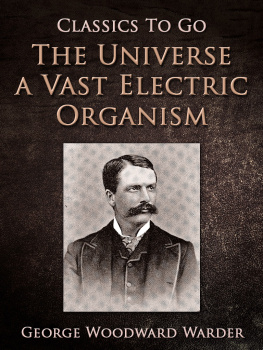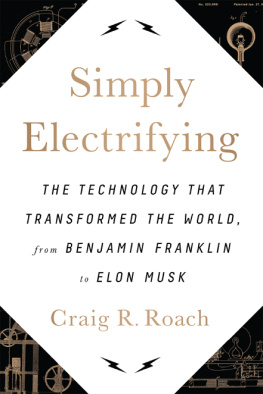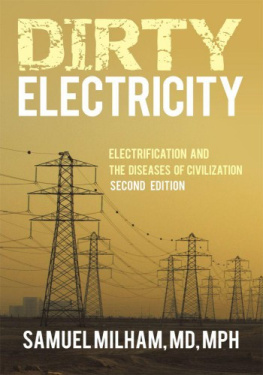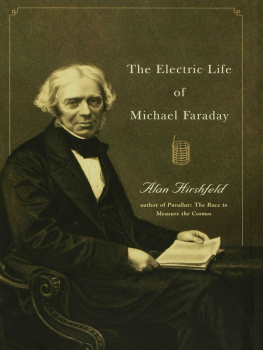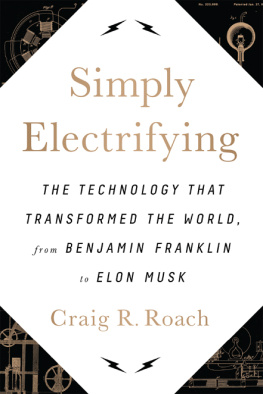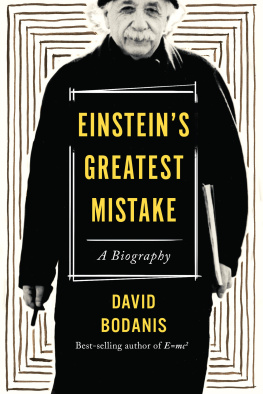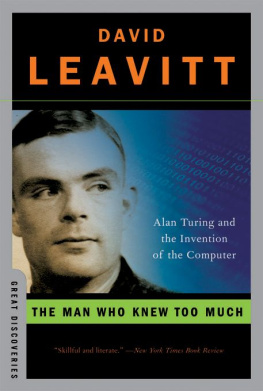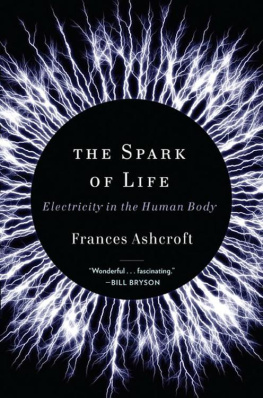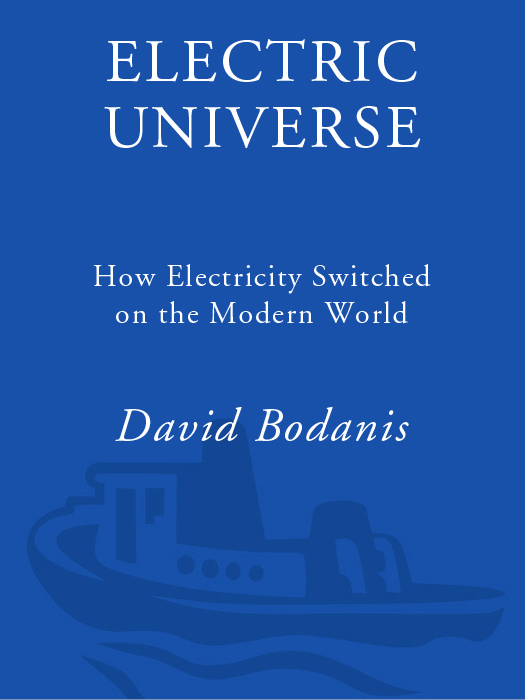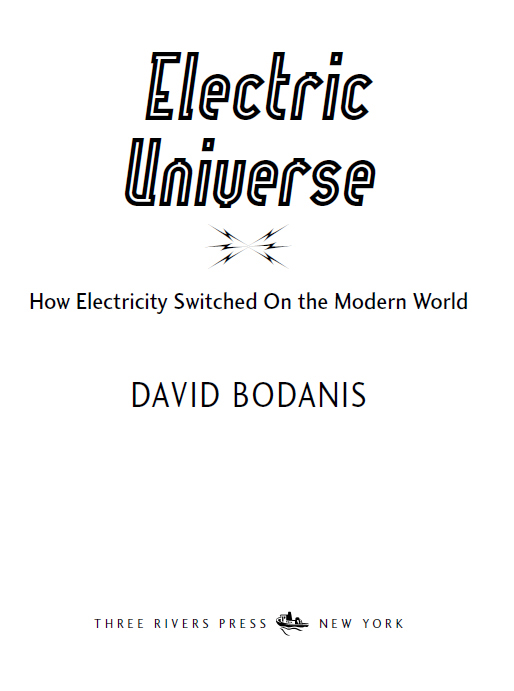CONTENTS
WIRES
Albany, 1830, and Washington, D.C., 1836
Boston, 1875
New York, 1878
WAVES
London, 1831
HMS Agamemnon, 1858, and Scotland, 1861
WAVE MACHINES
Karlsruhe, Germany, 1887
Suffolk Coast, 1939, and Bruneval, France, 1942
Hamburg, 1943
A COMPUTER BUILT OF ROCK
Cambridge, 1936, and Bletchley Park, 1942
New Jersey, 1947
THE BRAIN AND BEYOND
Plymouth, England, 1947
Indianapolis, 1972, and Today
To Sam and Sophie, my beloved children
To the city of Chicago, where what wisdom Ive been able to grant them long ago began
And to Natasha, who taught mewhen I needed it mosthow to navigate without a map
Mysterious affair, electricity.
SAMUEL BECKETT, Theatre II
INTRODUCTION
When my father was a little boy, in a village in Poland before the First World War, an electricity blackout wouldnt have been especially important. There were no cars, which meant there were no traffic lights to fail, and there were no refrigeratorsjust blocks of ice or cool roomsso food wouldnt suddenly spoil either. A very few rich people would find their electric lights failing if the generators stopped working in their homes, and the single telegraph line that passed through the town might stop operating, but by and large daily life would continue as it had before.
By the time my fathers family had migrated to Canada, and then to Chicago in the early 1920s, a big power outage would have been different. People would still have been able to buy thingsthere were no credit cards that depended on computer verificationbut the streetcars that workers rode to the factories wouldnt run. The telephones that offices depended on wouldnt work either, and the skyscrapers that the city was so proud of would quickly have become inaccessible, or at least their upper floors would have, as their elevators failed too. It still wouldnt have been a complete catastrophe. Farm crops could still be raisedthere werent many tractorsand coal-fired trains and steam-driven ships would have kept the city pretty well supplied.
Today, though? I live in London now, where people can be pretty phlegmatic, but I still wouldnt want to be around for a complete blackout. Most radios and TVs plug in these days, so it would be difficult to find out whether your kids school was still open. Your cell phone might still operate, but with no way of recharging your battery youd be pretty careful about using it. Driving the kids to school on the off chance it was open would be too much of a gamble, for gas stations depend on underground storage tanks, and until the blackout ended, stations wouldnt be able to use their electrically operated pumps to bring up more fuel to sell to anyone in the city. You couldnt stock up on groceriesno credit cards workingnor could you get more cash, for ATMs depend on electrically run computers too.
Within a week the city would really have broken down. Police stations would be isolated with their phones not working, and pretty soon their radio batteries would lose their charge as well; no one could call ambulances, for their radios or phone links would be out too. A few people might try walking to hospitals, but there wouldnt be much there: no X rays, no refrigerated vaccines, no refrigerated blood, no ventilation, no lighting.
Going to the airport to try to escape wouldnt help, for with backup generators not working, the airports radars would have shut down, nor could planes take off on manual control, for any fuel that remained in underground tanks couldnt be pumped up. As the blackout spread, the nations ports would have closed, with no electricity to run the cranes that moved their large containers and no way to check electronic inventories. The military might try to guard fuel convoys, but with their own vehicles running low on fuel, that wouldnt last long. If the blackout was worldwide, isolation would intensify. The Internet and all e-mail would have gone down very quickly; next the phone lines; finally, the last television and radio broadcasts would end.
Starvation would probably begin in the dense cities of Asia, especially with no air conditioning at food warehouses; within a few weeks of a complete blackout almost all the worlds cities and suburbs would be unlivable. There would be fighting, pretty desperate, for food and fuel, and with a world population of 6 billion, few people would have a chance of surviving.
But what if it were not only our supply of electricity that failed? What if the very existence of electrical forces stopped? All the Earths oceans would gush upward and evaporate as the electrical bond between water molecules broke apart. DNA strands within our body would no longer hold together. Any air-breathing organism that was still intact would begin to suffocate, for without electrical attraction, the oxygen molecules in air would bounce uselessly off the hemoglobin molecules in blood.
The ground itself would open up and begin to melt as the electrical forces that hold the silicates and other substances of our planet together let go. Mountains would collapse into the voids left where the continental plates had torn apart. In the last moments, a few living beings would see the sun itself switch off, as our stars electrically carried light abruptly stopped and the worlds very last day turned to night.
Why doesnt any of this happen? The force of electricity is very powerful, and has been operating nonstop for more than 13 billion years. But its also utterly hidden, crammed deep within all rocks and stars and atoms. The force is like two Olympian arm-wrestlers, whose struggle is unnoticed because their straining hands barely move. There are almost always equal amounts of positive and negative electric charge within everything around usso well balanced that although their effects are everywhere, their existence remains unseen.
For long eons it remained like thisas galaxies evolved and planets formed, as continents and trees and grasses appeared on Earth. Occasionally there must have been brief sightings in the past. Our australopithecine ancestors would have noticed abrupt bursts of lightning, as would early humans. But as soon as it appeared, this force would quickly have returned to the invisible realm from which it had come. For most of history, humans simply stumbled around it, unaware.
In one of his writings, Isaac Bashevis Singer imagines a peasant in medieval Ireland who takes off his flaxen tunic one night and notices bright sparks leaping from the fabric. If Singers peasant called in the village priest and other wise elders to see it happen the next night, they would be unlikely to notice anything: static electric sparks usually appear only in dry air, and Ireland is wet. No one would believe what hed seen; no one would have been able to examine it further. Even in dry desert countries, dust or sand could make scattered sparks seem to appear and disappear in purely random ways.
There were many fragmentary efforts to penetrate this hidden world, from classical Greek times on, but even into the mid-1700s there was little true knowledge. The breakthrough came with the work of a conveniently vain Italian investigator, Alessandro Volta, in the 1790s. It would be a great honor, he felt, to locate the portal from which this mysterious electricity emerged, and after much effort he realized where he should search. He found that if he pressed a coin-shaped copper disc against one side of his tongue, and a zinc disc against the other, and then touched the tips of the two coins together, a tingling sensation would race across his tongue. Hed located the worlds first steadily operating batteryin his mouth.


